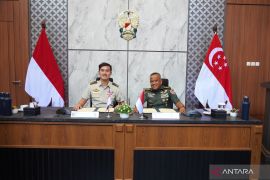So far, Singapore is importing about 700 million metric standard cubic feet per day (mmscfpd) of gas from Indonesia under a contract that will expire in 2020. On the other hand, due to increasing demand at home, Indonesia is also importing the commodity to cover a consumption deficit.
Indonesia`s gas consumption in 2005 for example was recorded at 3,541 mmscfd and it rose to 4,233 mmscfd in 2009. Thus, Indonesia is considering reducing its gas exports to Singapore amid difficulties to meet its own domestic need for the fuel.
A team to renegotiate Indonesia`s gas export contract with Singapore had already started working. "I have asked the team to accomplish a halt to additional gas exports to Singapore," Chief Economic Minister Hatta Rajasa told a working meeting with House Commission VII on energy affairs.
He said gas exports to Singapore had been too voluminous while there was a shortage in supply for domestic needs. Yet, Industry Minister MS Hidayat warned that Indonesia should not stop it all at once because it could result in a legal problem.
"I have heard that gas exports to Singapore will be stopped to meet the need for gas at home. I don`t think it should be totally stopped all at once," Hidayat said.
If the Indonesian step caused business damage to the Singapore side then the island state based on the Anglo Saxon law could file a complaint and sue Indonesia for defaulting on the contract.
The chairman of the Upstream Power Committee of the House`s Commission VII on energy affairs, Totok Daryanto said that the contract was made according to Anglo Saxon law which provided authorities for consumers to demand compensation. "The government will have to compensate the consumer for any loss by the termination of the contract," he said
Director General for Oil and Gas Evita Legowo said she had studied the possibility of reducing gas exports to Singapore but she declined to disclose the results of the study.
She said she had asked Singapore to lend some of the gas to which it was contractually entitled to Indonesia for some time. "We are studying the possibility of reducing or temporarily borrowing gas based on the existing contract with Singapore," she said.
Evita Legowo said her office had coordinated with the ministry of foreign affairs to re-negotiate the contract with Singapore. "Though it is difficult, yet we have to find a way," she said.
The House of Representatives (DPR) had earlier asked the government to divert some of the gas destined for export to Singapore to state-owned electricity company PLN to meet the utility`s need for the fuel.
Totok Daryanto, said although it would be difficult, he was convinced the government could do it. He made the remarks after a closed-door meeting with the director general of electricity who represented the Minister for Energy and Mineral Resources (ESDM)
Darwin Saleh at the meeting with the House`s Commission VII.
"The House supports the diversion of the gas to PLN," he said.
He said that of ConocoPhilips` gas production of 700 billion British thermal unit (bbutd), some 400-500 bbtud were exported to Singapore, while at the same time, PLN needed a large quantity of gas.
Totok said it would be difficult for the government to re-negotiate the contract with Singapore because the position of Indonesia in the contract was weak.
State gas distributor PT Perusahaan Gas Negara (PGN) estimated that the gas deficit would reach 385 billion British thermal units per day [BBTUD] in 2010, according to a report by the Jakarta Post last year, and will continue to increase until reaching 713 bbtud in 2015.
In the meantime, Minister Hatta Rajasa denied he had permitted additional gas exports to Singapore at the expense of state-owned electricity company PT PLN. "It is not true that a limited coordination meeting of the office of the coordinating minister for the economy has decided to supply 100 bbtud to Singapore," he said.
Evita Legowo, confirmed Hatta`s statement saying "there was no decision to allow additional gas exports to Singapore. What was agreed on was additional gas supply to increase Chevron`s production (PT Chevron Pacific Indonesia)."
The government has earlier decided to reduce gas supplies from state-owned gas distributor firm PT PGN to Muara Tawar PLTGU power plant belonging to PLN from 200 bbtud to 100 bbtud.
The decision, according to PT PGN, was made due to a drop in gas supply from gas producer ConocoPhillips to PGN after the government decided to shift it to Chevron to increase oil production and gas exports to Singapore.
PLN needs an extra gas supply of 600 billion British thermal unit per day to meet its gas needs of 900 bbtud. "We have 300 BBTUD now. We need another 600 bbtud," PLN President Director Dahlan Iskan said.
Therefore, PLN is looking into the possibility of gas supplies from Australia, Papua New Guinea and Qatar to meet its gas needs. "We will select which of them will offer the best price," Dahlan Iskan said.
Domestic industries had so far been relying on gas from sources or suppliers in the country. But until the end of 2011 state gas company PT PGN could only meet around 583 mmscfd of an existing demand for 863 mmscfd.
According to Industry Minister Hidayat, Indonesia will import gas from the Middle East to meet increasing demand following strong growth of national industries.
"National industries keep on growing so we need to anticipate a possible shortage of gas. The gas import is urgently needed because domestic supply is meeting only 60 percent of domestic need," Hidayat said.(*)
Reporter: Andi Abdussalam
Editor: Aditia Maruli Radja
Copyright © ANTARA 2011







